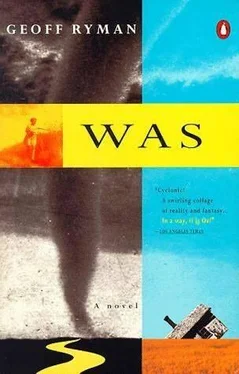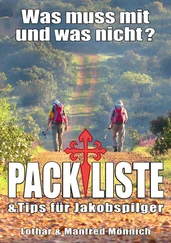They played Vikings. They would stand together on the prow of a longship, and they would attack a castle, but they were always on the same side. "Okay, men!" Matty would say, and they would all run together, brandishing swords.
They went to Sunday School. The Oz people came as well, but Jonathan couldn't concentrate on them. He got confused and stumbled over the words of the songs and couldn't answer the questions asked by the Sunday School teacher. The teacher wore tartan trousers, and her nose ran, like Helen's.
Afterward, Matty would be elated by the idea of goodness and became insistent on righteousness. She would say that you should do whatever Jesus told you. You should never say "ain't," though Matty otherwise said it all the time. Enlivened by religious instruction, they would play Jesus. Jonathan stood on a fence post, his arms outstretched, being crucified while the sisters adored him on their knees. He liked that game. His mother made them stop.
His mother did not entirely approve of Helen and Matty. Their family offended against the world of style and grace she was trying to build. The Quicke home was ugly, with roof tiles over all of the walls. Helen and Matty's elder brother was only ten, but he wore his hair greased up. He smoked cigarettes and had a dog called Nigger. His eyes were hard, and he trained them on Jonathan.
Once, it was their father's birthday. Jonathan joined Helen and Matty in singing "Happy Birthday" to him. Helen's father was a big man with big red hands and orange hair. Helen and Matty sat on his knees as they sang, and his rough face went kindly and soft. "I can't think of anything nicer," he said, "than to be sung to by two cute little girlies like you." Jonathan wondered why he felt so different from them.
The real world was pushing the Oz people to one side. They watched from the corner while Jonathan pondered the fact that rough Mr. Quicke could be kind. Outside again in the muddy backyard, the Oz people could only watch as Jonathan and Matty and Helen dug a hole to the Center of the Earth.
Why didn't he speak to the Oz people when Helen and Matty were around? He would try to, but fear would grip him. What was he afraid of? Jonathan decided that he would force himself, force himself to act as if the Oz people were there.
Jonathan knew how to behave. He had been drilled in politesse. He knew that you introduced people properly.
So one day, toward the end of that spring, he ushered Helen into his bedroom. He was going to do it. He really was going to do it.
"Helen," he said. "May I introduce the Oz people." He pointed to each one of them in turn. "The Lion. The Tin Man…"
He couldn't finish. Panic overcame him. Helen gasped and covered her mouth. He looked at her arms and the very fine, pale down on them. Helen stared at him, grinning, eyes wide. She knew what was happening. She knew that Jonathan thought the Oz people were really there. Jonathan tried to say something else, but the words stuck.
Helen squealed, hand over her mouth, and turned and ran. Disturbance seemed to follow her, swept in a spiral like a dust storm. It spun out of the doorway of Jonathan's bedroom, taking something with it.
Jonathan turned back to the corner of the room. There was no one there. He saw that there was no one there, that there never had been anyone there.
Shame covered him like darkness. Helen would know. Helen would tell. "Sissy," her brother called him. And he was a sissy, to make up people who were not there.
His room had been stripped bare of magic. It consisted now only of his parents' cast-off chest of drawers, the trampolined bed, some toys in which he had no interest. His room was devoid of interest. So were the grass and the trees beyond. It was this stark world from which he had been trying to hide.
He wanted to break every single toy, wrench off their heads, their butterflies on wires; he wanted to tear up all his books and rip to shreds all his drawings, everything he loved that was so thin and frail, and which could not defend him. The rage seemed to rise up into his eyes as an ache. He was blinded by anger, rising up in his gorge to choke him, overwhelming and complete. There was nothing that could satisfy it, but himself. He broke himself. He took the self he had been and broke it again and again. He called himself all the names he could think of: stupid idiot dope nincompoop sissy crybaby brat. Worm. He called himself a worm and seemed to see himself crushing himself underfoot. He stood absolutely still, with his elbow wrapped around his eyes. Then, very suddenly, he flung it away from his face and glared.
The world was diminished. It was smaller, duller, and he was unutterably bored by it. He didn't want to play with his crayons, his coloring book, his papers, his toys, his stupid plasticine. He prowled the field of his vision like a caged beast, restless, made aged and jaded and grim. He was five years old.
Helen's family moved away shortly afterward, to Brampton. In those days, there was a vast expanse of farmland between Corndale and Brampton. It seemed a long way away.
Jonathan was relieved. He and Helen had stopped playing together and her older brother was even more of a menace. Jonathan knew now that he would have to learn how to fight. He would have to learn how to throw a ball and to win at games. He was not a little boy any longer.
But one afternoon, just before they moved, Helen came running to Jonathan's house, calling his name over and over. It was an act of unexpected kindness. She wanted him to come out and look at the rainbow.
She rushed up the path, her pageboy bob flapping into her eyes and stains around her mouth. Jonathan sat disconsolately on his front steps.
"Jonny, Jonny, there's a rainbow!"
Jonathan had once yearned to see rainbows. He had seen them in storybooks, where they were short and thick and made of the brightest colors. Sitting there on the front steps, Jonathan was surprised by a tearful yearning for color, as bright as books.
He leapt up from the steps and ran down the artificial hill to meet her. "Where? Where?" he called.
They were suddenly friends, real friends, united in mutual excitement. "Up there! Up there!" Helen jumped up and down, over and over, pointing to the sky.
"I can't see it! I can't see it!" Jonathan cried.
As if infected by him, the rainbow disappeared for Helen as well. She walked backward, scowling. "Maybe you can't see it from here," she said. She led him running back to her house, back to the place where she had seen it. They ran up her drive and around the back and up the wobbly, unpainted wooden steps that led to the back door. The steps formed a kind of landing, high off the ground, above the deep foundations.
"There it is," said Helen, her arm pointing over Jonathan's shoulder. She jabbed her finger at it over and over. "There! There! There!"
Jonathan was being stupid again. How stupid could he get? He scanned the sky, trying to see something very short, an arch made of paint-set reds and greens and blues, all in sharply defined bands, as he remembered them.
"Cantcha see it, Jonny?" asked Helen's mother, Mrs. Quicke. She came out of her kitchen, wiping her hands on her apron. She leaned on the railings, a thin, worn woman with long hair pulled back in the fashion of ten years before. She wore glasses and had bad teeth.
"It's there, just keep lookin'," Mrs. Quicke said, with the rough, kind foreignness of someone else's mother.
"I can't see it," whispered Jonathan, as if in exile. Later, he would recall seeing dimly a wispy yellowish trail across the sky, like smoke.
Jonathan couldn't see the red or the orange; he couldn't see the green or the mauve. He could only see a brownish streak of mist and the blue beyond it.
Jonathan had become color-blind.
For him, green and red were muddled into a grayish brown. He no longer played with his box of fifty-two Crayola crayons. Color no longer sang to him. He could see no difference between blue and purple, between pink and gray. The world had become as dim for him as Oz on TV.
Читать дальше












